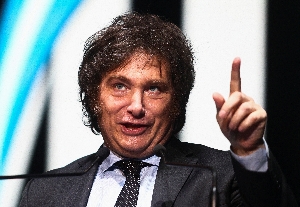Argentina has announced its withdrawal from the World Health Organization (WHO), aligning itself with a similar decision by U.S. President Donald Trump last month.
Presidential spokesperson Manuel Adorni made the announcement on Wednesday, stating that President Javier Milei had instructed Foreign Minister Gerardo Werthein to formally disengage from the global health body.
“We Argentinians will not allow an international organization to interfere with our sovereignty, especially in matters as vital as health,” Adorni said at a press conference.
Milei, who has often expressed admiration for Trump, appears to be following the former U.S. president’s lead. Trump withdrew the United States from the global health body on his first day back in the White House in January, citing the agency’s handling of the COVID-19 pandemic and what he described as excessive political influence from member states.
Argentina echoed similar concerns, with Adorni criticizing WHO’s approach to health management, particularly during the pandemic. He accused the agency of promoting “endless quarantines” that led to severe economic damage and “the longest lockdown in human history.”
A statement from Argentina’s presidential office further questioned the role of international organizations like WHO, arguing that they often fail to meet their original objectives and instead engage in global politics.
Trump, in his executive order withdrawing the U.S. from WHO, made comparable claims, accusing the agency of mishandling global health crises and lacking independence.
In response to Trump’s decision, WHO Director-General Tedros Adhanom Ghebreyesus expressed regret, emphasizing that the U.S. benefits from its participation in the agency as much as it contributes to it.
While WHO operates in Argentina, Adorni clarified that the country does not rely on WHO funding for its health programs.
“This decision does not mean a loss of funds for Argentina, nor does it impact the quality of our health services,” he assured.
Instead, he argued, leaving WHO would give Argentina more flexibility in shaping its health policies and ensure that resources are used in ways that directly benefit its citizens.
WHO, founded in 1948, has played a central role in coordinating global health efforts, from tackling pandemics to expanding universal health coverage. The organization operates in more than 150 locations worldwide, responding to crises such as Ebola, cholera, and yellow fever.
Despite Argentina’s withdrawal, global health experts warn that moves like this could weaken international cooperation on future health threats.


